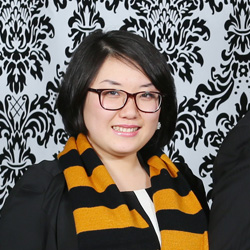The average undergraduate student spends a minimum of 15 hours a week in the classroom â more if his or her program has significant lab hours. Many students work part-time jobs, on campus and off, to pay for school. Then thereâs the research, the paper writing, the midterm and finals studying⦠well, you get the picture.
Put it all together, and you might not think thereâd be much time left for âstudent lifeâ â that catch-all title we apply to activities that include sports, student societies and volunteer/charity work. But even with their busy lives, Dal students can do some pretty extraordinary things with their âfree" time, as this yearâs Board of Governorsâ Award winners demonstrate.
The Board of Governorsâ Awards, presented at the Dal Impact Awards, are the universityâs highest honour for student accomplishments outside the classroom. They recognize exceptional contributions or leadership in the extracurricular realm, from university governance and community service, to athletics and the arts, to building campus community among students, faculty and staff. Students from any program or point in their studies are eligible for the award, which is chosen by a committee consisting of the president, three Board members and the vice-president student services.
More on the Impact Awards: Halifax, Truro
This yearâs winners are an eclectic group, encompassing undergrad and grad students, international and domestic students, athletes and musicians â all of whom have made an invaluable contribution to campus life during their time at Dal.
 Ding Fan (Management, fourth year)
Ding Fan (Management, fourth year)
Right before she arrived at Halifax, Ding Fan looked up the ºÚÁϳԹÏÍøChinese Students and Scholars Association (DCSSA) on the DSU website. âI wanted to find my fellow Chinese students, and when I got to meet them they were an awesome society,â says Ding.
They were a small group, though â just a handful of members, even though Dalâs population of Chinese students was growing rapidly. Ding saw an opportunity to help create a better sense of community among new Chinese students, and spearheaded a New Chinese Orientation the following September that quickly proved a big hit.
âThe education system in China is so different than here, and I was thinking about if I could help some incoming students with things like their transportation, their residence, those sorts of issues, it could help more new students feel comfortable to come here and make more parents think theyâre satisfied to send their children here. This fall we had around 300 new Chinese students come to our event and get help from our society.â
Ding, who received the International Student of the Year Impact Award last year, is now president of DCSSA, helping organize events like New Chinese Orientation and the Spring Festival (Chinese New Year) Galas. But she has many other roles on campus as well: sheâs served vice-president of executive in the ºÚÁϳԹÏÍøInternational Studentsâ Association, has had several key roles in the DSU (including society support coordinator and chief returning officer) and is the volunteer liaison for Dream Cops, a charity organization aimed at helping disadvantaged young children in rural China.
Her quest to integrate international students into the community stretches off-campus as well. Recently, she started her own not-for-profit organization called the Nova Scotia International Community Bridge Association.
âI know there are many international students who are eager to show their own culture to domestic students, but there is not a bridge⦠The idea for the organization is really to connect different communities and become a platform for people to get to know one anotherâs culture. I hope it benefits people who want to stay in Nova Scotia, to find opportunities and jobs here.â
 Christopher âKitâ Moran (Environmental Science/Special Undergraduate, sixth year)
Christopher âKitâ Moran (Environmental Science/Special Undergraduate, sixth year)
Kit Moran returned to campus for a sixth year this fall, looking to add a few more courses before considering his next move. Itâs allowed him to deepen his involvement in campus athletics.
âIâve been really fortunate with swimming to come a long way in the sport, over the years," says Kit. âAs I got older, and more opportunities came my way, I was also presented with more opportunities to give back, and I feel thatâs an important part of being an athlete. Youâre a community leader, and that means taking time to offer your support to that community.â
Kit is a five-time Academic All Canadian whoâs been a big part of the Tigersâ swim teamâs dominance in AUS competition. But heâs also played a key role on the ºÚÁϳԹÏÍøVarsity Council, in advocating for athletes as DSU athletics commissionaire, and in organizing the annual Dalympics as part of orientation week.
He says his most rewarding experience, though, has been in helping organize the Special Tigers Sport program, which brings together Dal students with youth with intellectual disabilities for an afternoon of sport.
âItâs such an incredibly rewarding volunteer opportunityâ¦Â with the Special Tigers, itâs all about fun. Itâs so great to see kids who wouldnât otherwise have these sporting opportunities having a blast, playing sports with athletes.â
As for how he manages it all, Kit says itâs about balance â and recognizing that giving back to the community is an essential part of what it means to be a Tiger.
âItâs so much more than sport,â he explains. âºÚÁϳԹÏÍøwonât let you in if all you are is sport. They look for a much more rounded person: being great academically, great at your sport, and finding time to give back. To be a Dal tiger, you have to strive to excel in all of those areas.â
 Ishika Sharma (Master of Science â Rehabilitation Research - Physiotherapy, second year)
Ishika Sharma (Master of Science â Rehabilitation Research - Physiotherapy, second year)
Ishika Sharma is passionate about the role international students play on campus and in the community.
âWhen I arrived at Dal, there were times I felt like there were gaps in the relationship between campus and the international students,â she explains. âIt was often small things, like in how people would seem unsure about how to talk to international students. I really wanted to bring an end to that, so thatâs why I got involved with DISA.â
In addition to serving as vice-president external affairs of DISA (the ºÚÁϳԹÏÍøInternational Students Association), Ishika, originally New Delhi, India, has also been vice-president academic affairs in the ºÚÁϳԹÏÍøAssociation of Graduate Students. Sheâs chaired the Sexual and Gender Resource Committee that brings together students from South House, DISA and the DSU, and has helped DISA put together a Multicultural Committee to connect members of different cultural societies on campus.
Sheâs also an international student representative on DSU council and was instrumental in helping add a second council rep for international students. Currently, sheâs also representing international students on a working group in the Nova Scotia Department of Labour and Advanced Education, taking part in consultations on how the province can improve services and supports for students from outside of Canada.
Even her two short years on campus, she feels like sheâs seeing progress in helping international students play a stronger role in the Dal community.
âI see students getting involved with other societies like South House, or the Student Union, connecting with other language and culture societies. Thatâs really big for me. Initially, international students werenât really speaking up for the problems they were having, and were hesitant to talk to others who werenât from their own culture. I see so many more international students now running for new councils and new boards, taking up executive positions in societies and interacting with the administration directly.â
 Taylor Thompson (Management, fourth year)
Taylor Thompson (Management, fourth year)
Each year, thousands of Dal students get their first impression of university life from their campus residence. For Taylor Thompson, originally from Whitby, Ont., that first impression was an incredibly positive one, and he was inspired in particular by the residence assistant (RA) role.
âI saw the role that RAs play in building that sense of community, connecting people on the floor in the building, just administering those connections,â he explains. âI gained great respect for them, in how they deal with situations and help people.â
In second year, he became an RA himself in Shirreff Hall, becoming a senior residence assistant (SRA) in Shirreffâs New Eddy house in his fourth year. In addition to mentoring and supporting this team, Taylor also helped lead an initiative to unite the three IWK Residence Charity events â the Kick-Off (soccer), the Tip-Off (basketball) and the Face-Off (hockey) â under one common banner. The events raise thousands of dollars each year for the IWK Foundation.
âWe worked on connecting the three and bringing them under one organizational unit, to make those synergies happen from the knowledge that we had from the Face-Off, which at the time was the most successful⦠the series really shows the difference that Dal students can make in the community.â
He applied similar organizational lessons in his work with Dalhousieâs JDC Central team, which competes in one of the largest business competitions in Canada. Taylor organized the bid for Dal to host the competition in 2013, leading an organization committee of 12 students and alumni in raising close to $250,000 in support and hosting an incredibly successful event.
âIt was really showcasing Dal as a premier business school in the east,â says Taylor. âIt was great that we could bring 500 students from Ontario, New Brunswick and Quebec and showcase Dal as the force that it is.â
 Caitlin Urquhart (Law, third year)
Caitlin Urquhart (Law, third year)
In her first year at the Schulich School of Law, Caitlin Urquhart struggled with some mental health challenges.
âThe culture at law school, and the profession more broadly, tends to be a âsuck it upâ mentality, one in which the idea of discussing mental health and its importance was not spoken of openly,â says Caitlin, originally from Newmarket, Ont. âMeanwhile, throughout the legal profession, we have a huge prevalence of depression, anxiety, substance and alcohol abuse.â
Studies have shown that rates of clinical depression are much higher among both law students and practitioners than the national average.
âBecause of my experience, the fact that I felt isolated, I really wanted to work to change that culture, to subvert some of that stigma and make it a place that was open, welcome and where we didnât have to feel ashamed or embarrassed about having those struggles that are actually quite common.â
Caitlin has been part of the executive of the Law Studentsâ Society (LSS) every year of law school (currently as president) and sheâs made âwellnessâ a key priority. She founded the law schoolâs Wellness Committee, drafted a mental health strategy for the LSS and has been working to get a peer support initiative underway. Some of the Wellness Committeeâs activities that Caitlin has helped spearhead include a wellness month, stress management seminars, workshops on overcoming procrastination â all to encourage mental health as part of the overall professional development experience for aspiring lawyers.
âItâs very rewarding for me to be in a leadership role, to be able to have a role in shaping the legal community going forward,â she explains. âIf we promote mental health from the time of law school, then weâre going to have a community of lawyers who are more empathetic, more compassionate and have a better ability to manage their own mental health.â
 George Woodhouse (Sociology and French, fifth year)
George Woodhouse (Sociology and French, fifth year)
If there were an award for âmost recognizable student on campus,â George Woodhouse might be a front-runner.
As the songwriter behind the DSUâs popular âSee You In Septemberâ video, heâs been something of a musical welcome to new students. (The video has had more than 31,000 views in the past three years.) He also wrote the âStudent Poverty Song,â which also went viral (53,000+ views) after the DSU helped turn it into a music video. And his band Tiger Patrol has been a fixture at campus events like Open House and Induction.
âSome of the most rewarding moments have been when people come up and say, âBefore I came to Dal I watched that video and that made me want to come out here,ââ says George, originally from Owen Sound, Ont. âKnowing that you were part of someoneâs journey is a gift that just keeps giving.â
George is perhaps most at home on the Grawood Stage, where he hosts the DSUâs popular open mic night.
âI was pretty stoked and honoured at the time, and pretty nervous,â he says about taking on the job. âBut since then Iâve probably hosted more than 40 of them over the past two years, so now I feel I can really be myself in front of crowds."
Noted for his infectious enthusiasm and friendliness, George says that student life, for him, is âa lot of saying 'yes,' and always being open to opportunities.â Heâs been an orientation leader, has worked through the International Centre to support students from away, and sees music and art as key components of building community on campus.
âStudent life is where we get to apply these tools weâre learning in the classroom,â he says. âItâs a place where all students â first year to fifth year, international or Canadian â can come together. When I think about my time at Dal, I donât immediately leap to the classrooms. The first thing I think of are these things like the TEDx events or Open Mics.
"There is a community here at Dal that wants to grow with you â it wants to get to know you and give you a place to pursue a passion. My mom always says, 'just show up,' and my dad always says, 'once you show up, just have fun.' After five years at Dal, it's been advice that has done me well."Â

